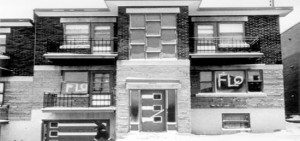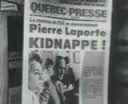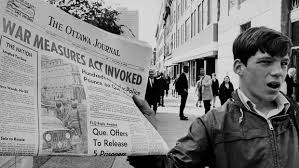
I met the man at a party. He told me he’d just experienced the worst week of his life. He said he’d been rounded up in a Quebec City dragnet and that the police told him they had the authority to keep him in jail indefinitely. I was all ears. I figured I could somehow benefit from listening to his story. Better than that, as the host of a regular radio broadcast, I hoped I could get his story on the air.
“I was a victim of the War Measures Act,” he told me.
“Would you come on my radio show?” I asked him. “I’d like you to tell your story.”
As it turns out, his experience was indeed one that every Canadian wanted to hear at that moment.

It was the fall of 1970. The country was in the middle of what the federal government considered an armed insurrection. A terrorist group – Front de Libération du Québec, a.k.a. the FLQ – had recently kidnapped a British trade commissioner and a Quebec government cabinet minister. For the two men’s release the FLQ demanded release of “political prisoners,” $500,000 in gold, publication of the FLQ manifesto, and safe passage out of the country to Cuba.
Things escalated from there. Police and governments attempted to track the kidnappers. The terrorists threatened the execution of the hostages unless their demands were met; (ultimately they killed Pierre Laporte, Quebec minister of labour). The Prime Minister called out the Canadian army to guard public buildings. And news reporters challenged Pierre Trudeau to explain what they viewed as military rule.

On Oct. 16, 1970, Trudeau imposed the War Measures Act (WMA), which denounced the FLQ as unlawful and declared any person who might hold FLQ membership or who might support the FLQ as liable to arrest “without bail for up to 90 days.”
“Proof that you are a member of the unlawful association (the FLQ),” the War Measures Act went on, “(could be) shown by speaking publicly in advocacy of the unlawful association.”
That’s exactly what my interviewee and I had done on my radio program that October night in 1970. In my attempt, as a very green journalist, to allow my guest from Quebec City free expression about his arrest and his time in jail, we (both interviewer and interviewee) had broken the law. I guess it’s an indication how few people were listening to my late night college radio program, that neither of us was heard or prosecuted. But I think it’s fair to say that our naive instincts (45 years ago) continue to drive what has become a pillar of Canada’s democracy.
This week a number of civil rights and media rights organizations (as well as the United Nations) recognized May 3 as World Press Freedom Day, reminding governments to respect and uphold the right of journalists and media outlets to speak and write freely.
In fact, in time for the May 3 observance, the Canadian Journalists for Free Expression (CJFE) published a poll calculating public attitudes about media freedom in this country. The CJFE survey determined that over half (54 per cent) of Canadians trust the current federal administration over the previous one “to strike the right balance between protecting the rights of Canadians and our need for secrecy.”
However, the CJFE offered a report card on the Liberals’ actions and promises so far. Among specific reference points, such as Bill C-51, the CJFE acknowledged the current government’s plans to seek the public’s view; it gave the Liberals a C- there. With regard to the federal government’s announced intentions to review the Access to Information Act, journalists were heartened; but the Liberals’ plan to delay those intentions two years earned them another C-.
On the issue of protecting whistleblowers, the feds seem uninterested; the CJFE grade is an F. While recent attacks on the press in Montreal, demanding among other things the release of their sources, has garnered the government a D grade. Ontario’s so-called anti-SLAPP (Strategic Lawsuit Against Public Participation) legislation, protecting journalists and activists from being hit with lawsuits has garnered the provincial government an A+.
“Canadians are hopeful that the current government will be more open in its policy making,” CJFE Executive Director Tom Henheffer said in a press release. “While some trust in our representatives has been restored through actions like un-muzzling federal scientists and opening consultations on access to information, Canadians clearly feel the government needs more transparency on key issues.”
For the record, while Pierre Trudeau was in power, in November 1970, the War Measures Act was replaced by the Public Order (Temporary Measures) Act. That act subsequently expired in April 1971. But it was another 17 years before the WMA was ultimately repealed because in effect it suspended all Canadians’ civil liberties. Even in a First World democracy, it seems, the preservation of free speech takes time to achieve.